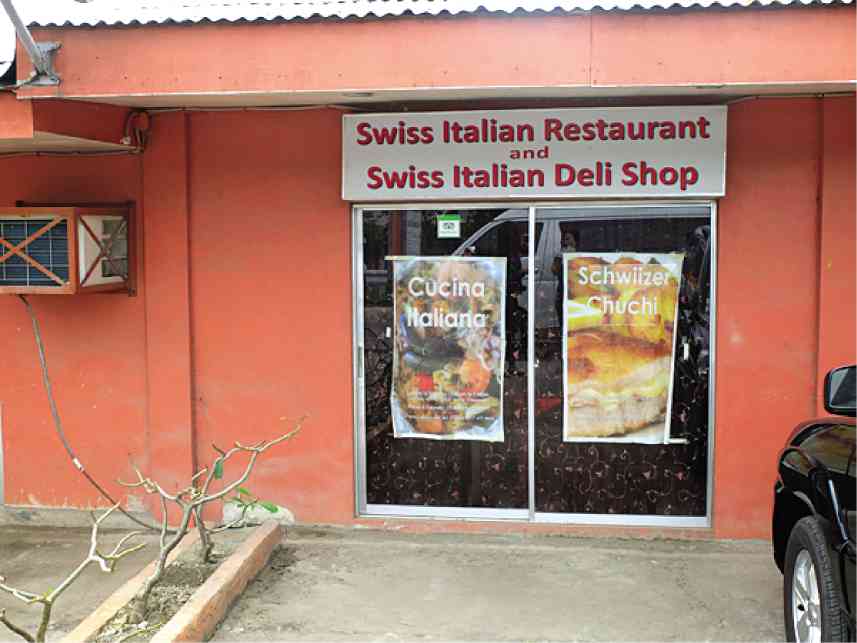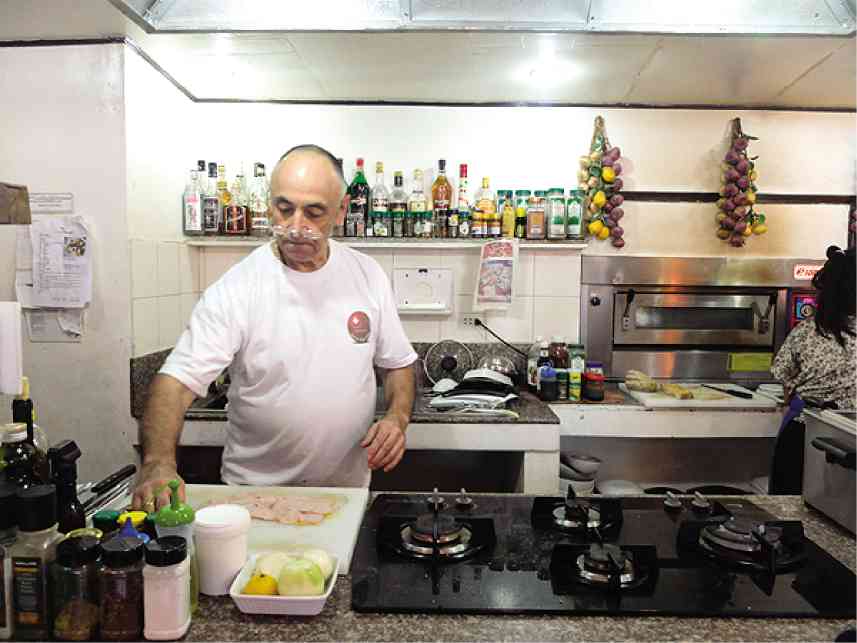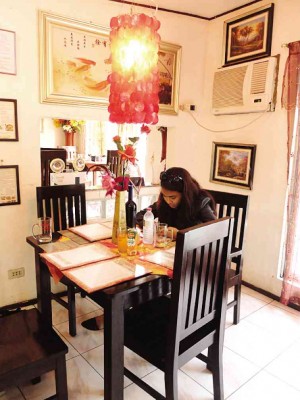Swiss-Italian enterprise out to charm Cebu
Alfredo Honegger, 60, tends to assist customers up the steps of his Swiss-Italian restaurant in Cordova, Cebu.
The gesture signals that it is going to be a different level of personalized service.
Unlike most other restaurateurs, chef Honegger chats first with customers before a server hands out two menu cards: one for Italian dishes and the other for Swiss.
He welcomes guests like longtime friends he hasn’t seen in decades.
Honegger, of Swiss-Italian descent, set up shop in 2012. Frustrated in not finding authentic Swiss and Italian food in the Philippines, he decided to open his own restaurant.
Authentic Italian
“In most restaurants here, carbonara is cooked with cream and mushrooms,” Honegger says. “That is not carbonara. That’s mushroom cream pasta.”
Carbonara, he explains, “is prepared with bacon, onions, garlic, egg and parmesan… The original is cooked only with butter and parmesan, not cream.”
A jet-setter since he graduated with a hotel management degree in 1989, Honegger at first set out for a career in international hotels.
But that career path was disrupted by a job offer from AMC International, maker and distributor of premium cookware.
According to Honegger, his stint at AMC allowed him to cook side by side with famous food experts like the Frenchman Paul Bocuse, Austrian Eckart Witzigmann, Swiss Frédy Girardet, and Italian Massimo Bottura, among others. It was at AMC where he met his future wife.
For his natural cooking skills, Honegger gives credit to his mother and grandmother. His mother is Italian and his father is Swiss.
“My heart beats for both countries,” he says.
More than cooking good food, Honegger’s mother taught him “how to cook food with love and care.”
He grew up in Winterthur, a city in Zurich, Switzerland.
Kitchen memories
“Every family kitchen is marked by memories,” he recalls. “There have always been mothers who have passed their cooking tradition from generation to generation. Many unforgettable dishes from childhood arouse desire, warmth, and confidence.”
These memories of his childhood is also one of the reasons why he decided to put up the restaurant beside the Honegger residence.
“I compiled all the dishes from the traditional Swiss family kitchen and tailored them without taking away their original and traditional character,” Honegger explains. “The Swiss-Italian Restaurant Cebu offers a great variety of everyday and simple dishes with tradition, which are worth rediscovering.”
Honegger came to Cebu in 1972 as part of a six-week vacation trip. That year, he visited Banaue, Bontoc, Baguio, Davao, Legaspi City, Zamboanga and Manila.
As part of his job with AMC, he would often travel to Hong Kong, Japan and Singapore.
In 1992, he settled in Manila.
“But I didn’t like it there,” Honegger recalls. “Too much traffic and pollution. It took more than two hours for me to get to my office on Pasong Tamo Extension from my house in BF Homes, Parañaque.”
Honegger, who is married to Lumenaria, moved to Cebu in November 1996. The couple has four children: Precila, 18, Manuela, 16, Gabriel, 14, and Michael, 9. His wife is from Macrohon, Southern Leyte.
He likes Cebu because of its “many nice beaches and in less than an hour you can be on top of a mountain in the middle of nature.”
In 2004, they brought their children to Switzerland “so that my children could learn German, French and Italian.”
Open kitchen
Diners who patronize Swiss-Italian Restaurant Cebu are advised to be patient.
Honegger doesn’t believe in precooked food, so he cooks all the orders in his open kitchen from scratch. Customers can watch him cook. He encourages visitors to take photos as he explains to them why he uses this or that spice or ingredient.
When asked if he ever used ketchup on pizzas, he vehemently said no.
“We don’t use ketchup on our pizzas,” he stresses. “We are a ‘slow food,’ not ‘fast food’ restaurant,” Honegger quips.
He doesn’t have a sous chef at the the restaurant. He only has a couple of helpers, and his kids will sometimes help him cook.
Depending on the dish ordered, it takes about 5 to 15 minutes before the food is served.
He says that 80 percent of the ingredients, including some types of meat, are imported.
“Vegetables are always fresh because we get the delivery twice a week from an organic farm in Davao and in Bukidnon,” he says. “The beef and pork are aged meat, which I import from a Swiss butcher. I buy the fresh fish, seafood, and poultry daily at the Carbon Market in Cebu. All other ingredients like cheese, cured meat, pasta, rice, extra virgin olive oil, and other typical, genuine and authentic ingredients are imported directly from Switzerland and Italy.”
On Filipino food, Honegger confesses that he likes Pinoy dishes cooked with “coconut milk, chili and fresh leaves.”
As for the unlikely location of his restaurant, Honegger says: “If you offer good food, it’s not important where the place is because people will find you. And once they know where you are they will always return. Forty percent of our customers come back weekly, and they often bring new friends with them. We also have many business people who come over to eat here.”
Swiss-Italian Restaurant Cebu sits about 20 people. Honegger also owns People’s Water, Flavor of Asia and Shabu-Shabu Native Restaurant.
He will soon open a Swiss-Pinoy bakery, a Filipino canteen and a sari-sari store.



